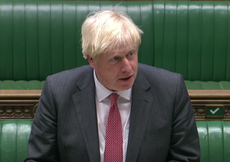Rishi Sunak job support leaves 500,000 self-employed ‘in the lurch’, claims Labour
Creative and hospitality sector workers ‘could be left with £450 a month support’
Your support helps us to tell the story
From reproductive rights to climate change to Big Tech, The Independent is on the ground when the story is developing. Whether it's investigating the financials of Elon Musk's pro-Trump PAC or producing our latest documentary, 'The A Word', which shines a light on the American women fighting for reproductive rights, we know how important it is to parse out the facts from the messaging.
At such a critical moment in US history, we need reporters on the ground. Your donation allows us to keep sending journalists to speak to both sides of the story.
The Independent is trusted by Americans across the entire political spectrum. And unlike many other quality news outlets, we choose not to lock Americans out of our reporting and analysis with paywalls. We believe quality journalism should be available to everyone, paid for by those who can afford it.
Your support makes all the difference.Half a million self-employed people have been “left in the lurch” by chancellor Rishi Sunak’s new coronavirus support package, according to a new analysis by Labour’s Ed Miliband
The workers, in sectors which have either been shut down or severely restricted by measures to control Covid-19, will see their monthly support cut in half from next weekend.
And shadow business secretary Mr Miliband calculated that this will mean the average self-employed worker in the arts or hospitality sectors receiving just £450 a month through the scheme this winter.
“That’s not just callous, but economically wrong,” he said.
Mr Sunak was hailed on Thursday for a package which offered grants to businesses hit by Covid restrictions, improved support for workers coming back on a short-time basis, and increased the sums available to the self-employed from November from 20 to 40 per cent of pre-pandemic profits.
The Treasury said the change to the self-employment income support scheme (SEISS) would increase the maximum monthly payment from £1,875 to £3,750.
But Labour said that hundreds of thousands of self-employed will still take a big hit, as the revised scheme still represents a sharp reduction from previous grants worth 70 or 80 per cent of average profits.
Analysis of payouts under the first tranche of the scheme in the spring showed average grants to self-employed people in the arts and hospitality sectors amounted to £900 a month, equating to 80 per cent of pre-Covid monthly trading profits of £1,125.
Under the 40 per cent rule from 1 November, the same person would receive just £450 from the scheme, despite theatres, music venues and many bars and pubs being closed as a result of government restrictions.
Labour said that self-employed workers in sectors either closed or unable to operate normally because of restrictions included 177,000 in creative, arts and entertainment jobs, 97,000 in sports and recreation activities, 83,000 in food and drink venues, 52,000 in accommodation, 41,000 in film, TV and music recording, 18,000 in libraries and museums, 17,000 in travel agencies and tour operators and 3,000 in gambling and betting.
Mr Miliband rejected the Treasury’s argument that the welfare system will top up their incomes to an adequate level.
For every pound received through SEISS, a self-employed person’s universal credit payment will reduce by 63p, he said.
Meanwhile, those with working partners, without children or owning their own home may not receive enough universal credit to plug the gap left by the reduction in financial support. And those with savings over £16,000 – often squirrelled away by the self-employed in anticipation of future tax bills – will be ineligible for the benefit.
Many other self-employed people have been excluded from the scheme altogether, including the newly self-employed and those who usually made over £50,000 in profit a year.
“The promise of doing ‘whatever it takes’ to protect workers is a distant memory,” said Mr Miliband.
“Despite public health restrictions tightening and many sectors being shut, ministers are leaving self-employed people in the lurch.
“Almost half a million self-employed people work in industries either partially or fully closed. They’re in desperately choppy waters with many deeply worried about their future.
“Yet ministers are taking away their life raft and leaving them to sink or swim. That’s not just callous, but economically wrong. These are our country’s artists and performers, and people in our vibrant tourism, sports, cultural and hospitality sectors."
Philippa Childs, head of the Bectu union which represents many freelancers in the creative industries, said: "A blanket policy of 40 per cent for the self-employed will not work for these industries and will have a devastating impact on the skilled workforce that are the backbone of this £100bn sector.
“The government must act now to fix the SEISS so that it targets support at those who need it most and ends the exclusion of millions of workers.”
Kate Dearden, of the Community trade union for the self-employed, said: “There is a clear disparity between the support available for employees who will be receiving over 60 per cent of their income through the job support scheme and that for the self-employed who can receive just 40 per cent of their profits.
"This disparity, alongside the thousands of self-employed people who are ineligible for support makes a laughing stock of the prime minister’s promise that no one would be left behind.”
And Andy Chamberlain, director of policy at the Association of Independent Professionals and the Self-Employed (Ipse), said: “Two-fifths of income simply will not be enough for many of the UK’s creative freelancers, who are the backbone of our vital cultural, entertainment and hospitality sectors.
“Government must take note and drive more and better targeted support to self-employed people in need – especially our forgotten freelancers and those working in badly struggling sectors.”
A Treasury spokesperson said: “We’ve supported the self-employed with over £13bn in grants and the chancellor yesterday doubled the generosity of the SEISS grant extension from 20 to 40 per cent of people’s profits. That makes the UK’s support amongst the most generous in the world.
“It is not true to say this is the only support available to these groups. Depending on their circumstances, they might qualify for grants worth up to £3,000 a month, tax write-offs, deferrals and support through the reinforced welfare safety net.
"Similarly it is not true to say that the hospitality and arts sectors have not received targeted support. The former have benefited from VAT cuts, targeted grants and more, while we have committed £1.57bn of dedicated support to keep our culture industry alive through a difficult time.”





Join our commenting forum
Join thought-provoking conversations, follow other Independent readers and see their replies
Comments